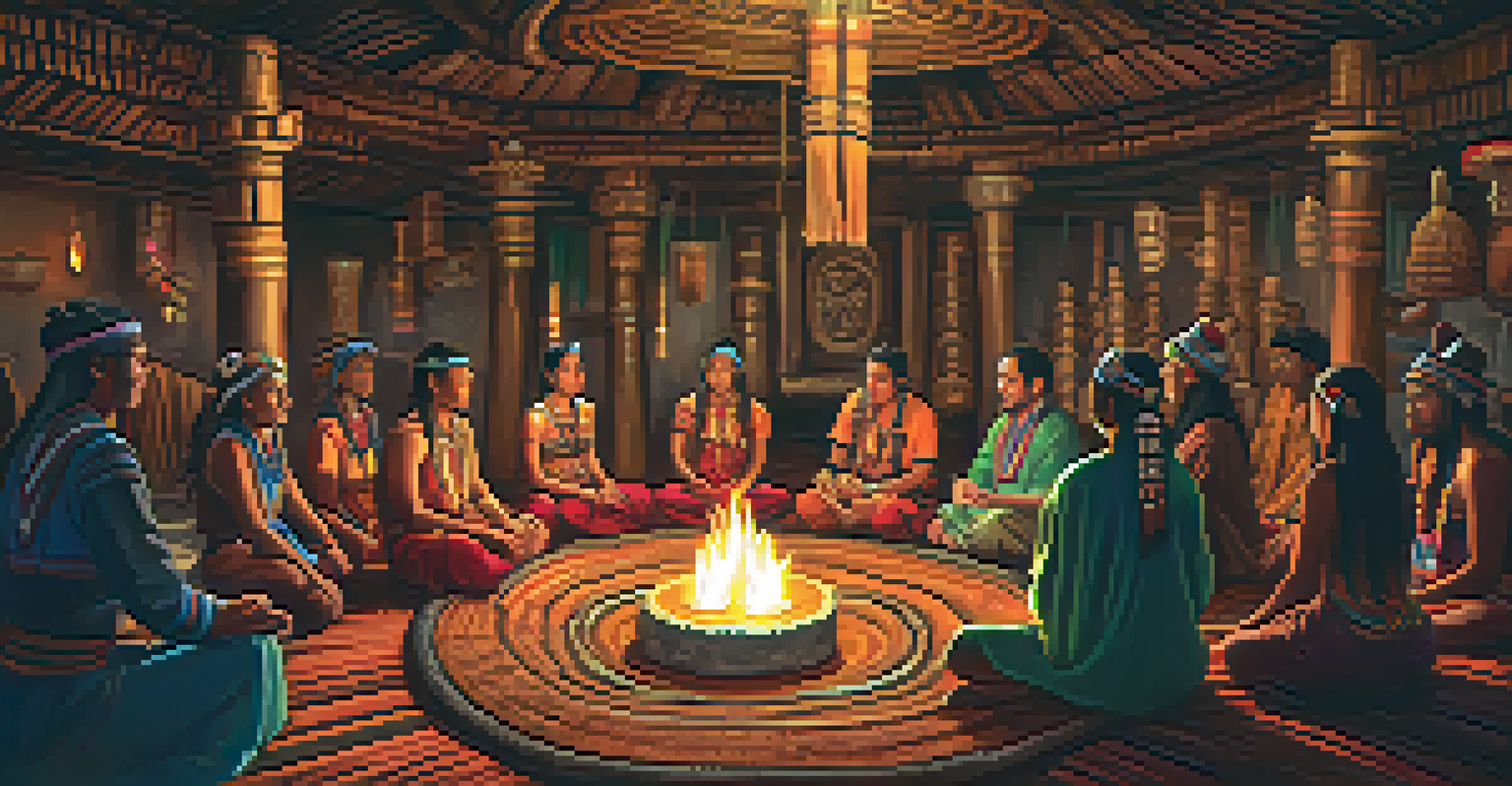Globalization and the Revival of Ancient Entheogenic Cultures

Understanding Entheogens: A Journey Through History
Entheogens, derived from the Greek words for 'generating the divine within,' refer to psychoactive substances used in spiritual contexts. These substances have a rich history, often associated with ancient rituals and cultural practices aimed at enhancing spiritual experiences. From the sacred mushrooms of Mesoamerica to the ayahuasca brews of the Amazon, these plants have long been integral to human connection with the divine.
Psychedelics can help us understand the nature of consciousness and the potential for healing and transformation within ourselves.
As globalization progresses, a renewed interest in these ancient practices has emerged. People are increasingly seeking connections to their roots, often turning to these traditional substances for guidance and insight. This quest for spiritual authenticity intertwines with the modern world's complexities, creating a fascinating contrast between ancient wisdom and contemporary life.
In this context, entheogens are not merely substances; they are gateways to understanding ourselves and the universe. The revival of these ancient cultures invites us to explore the depths of human consciousness, providing a deeper appreciation of our shared humanity across diverse cultures.
Globalization: A Double-Edged Sword for Ancient Cultures
While globalization facilitates the spread of knowledge and practices, it also poses challenges to the authenticity of ancient cultures. As these practices gain popularity in the global marketplace, traditional uses may be diluted or commercialized, risking their original significance. This phenomenon can lead to a form of cultural appropriation, where the essence of the practice is lost in translation.

Conversely, globalization can also empower indigenous communities to reclaim their cultural heritage. Social media platforms and digital communication enable these communities to share their stories, rituals, and the sacred significance of their entheogenic practices with a global audience. This newfound visibility can foster appreciation and respect, encouraging deeper understanding and collaboration.
Ethics in Entheogen Use Matter
Responsible use of entheogens requires thoughtful consideration of ethical issues, including consent, cultural ownership, and environmental sustainability.
Ultimately, the impact of globalization on ancient entheogenic cultures is complex, requiring a balance between sharing knowledge and preserving authenticity. As we navigate this terrain, it becomes essential to approach these practices with respect and an understanding of their historical context.
The Role of Modern Science in Understanding Entheogens
Modern science is increasingly validating the therapeutic potential of entheogens, shedding light on their psychological and spiritual benefits. Research into substances like psilocybin and ayahuasca has revealed their ability to alleviate conditions such as depression, anxiety, and PTSD. These findings are prompting a shift in perception, viewing entheogens not just as recreational substances but as tools for healing and transformation.
Cultural appropriation happens when a dominant culture takes from a marginalized culture without permission, often stripping the original meaning and context.
Moreover, this scientific interest encourages a dialogue between ancient wisdom and modern practices. By studying the effects of these substances in clinical settings, researchers can bridge the gap between traditional knowledge and contemporary therapeutic applications. This collaboration can enrich our understanding of the human experience, blending ancient practices with modern healing methodologies.
As science continues to explore these realms, it is crucial to approach findings with humility and respect for the cultural origins of these practices. By honoring the traditions while embracing modern insights, we can create a holistic framework for understanding the value of entheogens in today's world.
Cultural Exchange: Reviving Ancient Practices in New Contexts
Globalization fosters cultural exchange, allowing ancient entheogenic practices to find new life in contemporary settings. Spiritual retreats, workshops, and ceremonies centered around these substances are popping up worldwide, attracting participants eager to explore their spiritual dimensions. This revival often blends traditional rituals with modern interpretations, creating unique experiences that resonate with diverse audiences.
However, this blending of cultures requires sensitivity and respect for the origins of these practices. It is essential to engage with indigenous communities, ensuring that their wisdom and traditions are honored rather than appropriated. Collaborative efforts can lead to enriching experiences that benefit everyone involved, fostering a sense of shared learning and respect.
Entheogens Bridge Ancient and Modern
Entheogens serve as a connection between ancient spiritual practices and modern therapeutic applications, highlighting their potential for healing and self-discovery.
Through cultural exchange, we can appreciate the richness of entheogenic traditions while acknowledging their roots. This dynamic interplay between ancient and modern practices can enhance our spiritual journeys, offering new perspectives on age-old questions about existence and consciousness.
Ethical Considerations in the Modern Use of Entheogens
As interest in entheogens grows, so do the ethical considerations surrounding their use. Questions of consent, cultural ownership, and environmental sustainability come to the forefront. It is vital to navigate these issues thoughtfully, ensuring that the practices are conducted respectfully and responsibly.
One pressing concern is the environmental impact of sourcing these substances. Many entheogenic plants are becoming endangered due to overharvesting and habitat destruction. Therefore, sustainable practices and ethical sourcing must be prioritized to preserve these sacred plants for future generations.
Furthermore, the importance of educating participants about the cultural significance of these substances cannot be overstated. By fostering awareness and understanding, we can create a more respectful landscape for the use of entheogens that honors their ancient roots while embracing their modern application.
Personal Stories: Transformations Through Entheogenic Experiences
Many individuals have reported profound transformations following their entheogenic experiences, often describing them as life-changing. These personal stories highlight the potential of these substances to catalyze deep introspection and healing. From overcoming trauma to finding a renewed sense of purpose, the impact of these experiences can resonate long after the session ends.
For instance, someone may attend an ayahuasca ceremony seeking clarity about their life's direction. Through the experience, they might confront past traumas and gain insights that lead to significant lifestyle changes. Such narratives underscore the power of entheogens to facilitate personal growth and emotional healing.
Globalization's Impact on Cultures
While globalization can dilute the authenticity of ancient practices, it also empowers indigenous communities to reclaim and share their cultural heritage.
Sharing these stories helps demystify entheogenic practices, encouraging others to consider their potential benefits. By highlighting individual journeys, we can foster a deeper understanding of the transformative power embedded within these ancient traditions.
The Future of Entheogenic Cultures in a Globalized World
Looking ahead, the future of entheogenic cultures will likely continue to evolve within the tapestry of globalization. As more people seek spiritual connection and healing, these ancient practices may become integral to the broader conversation about mental health and wellness. This shift could lead to a more profound appreciation for the cultural significance of these substances, promoting their responsible use.
Moreover, ongoing dialogue between scientists, indigenous communities, and modern practitioners will be crucial in shaping this future. Collaborations can lead to innovative approaches that honor tradition while embracing new insights. By fostering mutual respect and understanding, we can create a landscape where ancient cultures thrive alongside modern developments.

Ultimately, the revival of entheogenic cultures in a globalized world presents both opportunities and challenges. By approaching this journey with an open heart and mind, we can learn from the past and create a future where these ancient practices enrich our collective experience.